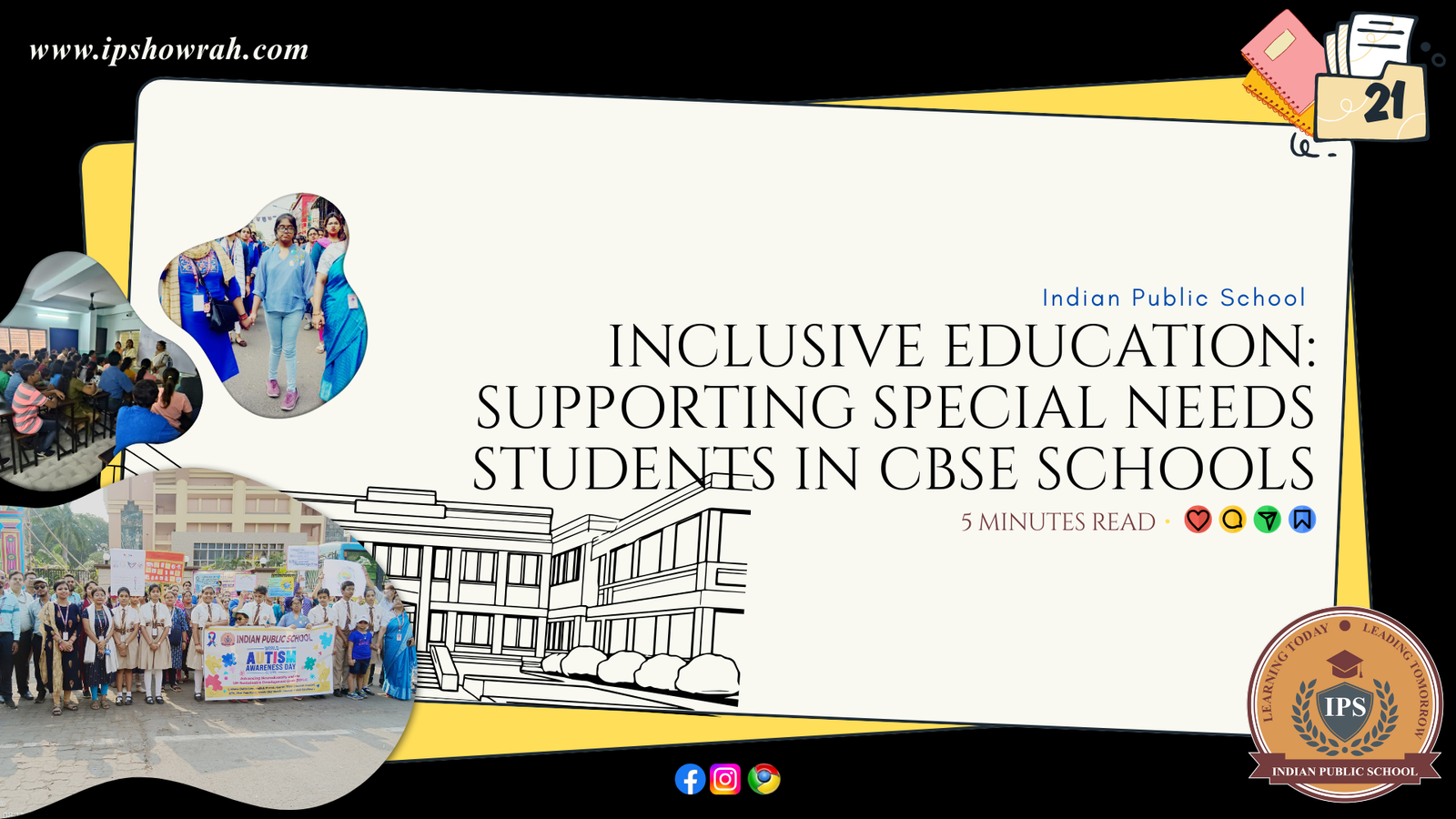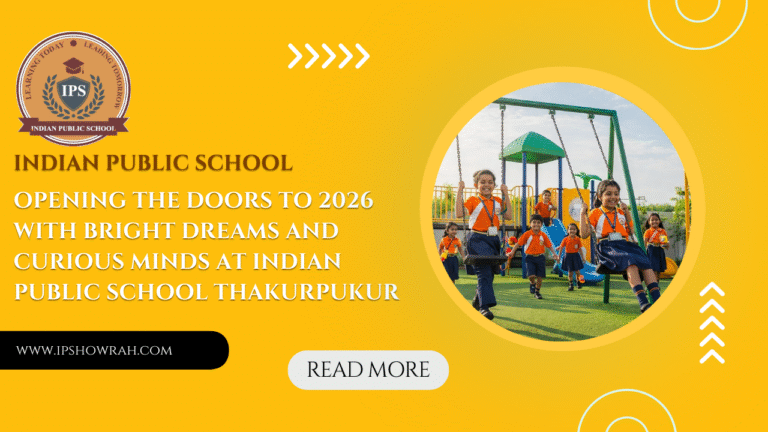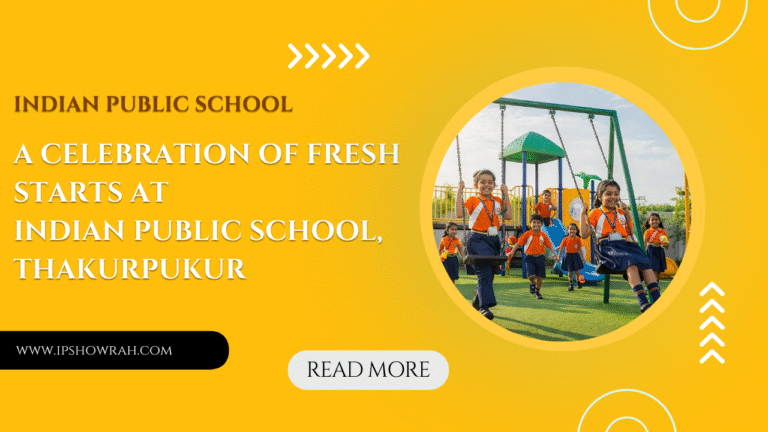Inclusive Education: Supporting Special Needs Students in CBSE Schools

Inclusive education is a core value in CBSE schools, ensuring that every child—regardless of ability—has access to quality education, equal opportunities, and a supportive environment. Schools like Indian Public School, recognized as one of the best schools in Howrah, are leading the way in making classrooms welcoming and empowering for students with special needs.
What Is Inclusive Education in CBSE Schools?
Inclusive education means that students with special needs learn alongside their peers in mainstream classrooms. It is about removing barriers, celebrating diversity, and providing the right support so every student can succeed academically and socially.
CBSE has made inclusive education a priority, guided by national policies and the Rights of Persons With Disabilities Act. Schools are required to admit children with special needs without discrimination and to provide the resources, infrastructure, and support systems necessary for their growth.
Key Support Systems in CBSE Schools
1. Individualized Education Plans (IEPs)
CBSE schools often create Individualized Education Plans for students with special needs. These plans are tailored to each child’s strengths and challenges, outlining specific learning goals, accommodations, and support services. Teachers, parents, and specialists collaborate to ensure the plan addresses the unique needs of the student.
2. Special Educators and Support Staff
Trained special educators work alongside classroom teachers, implementing personalized strategies and interventions. Support staff help with daily routines, learning activities, and emotional well-being, ensuring students receive the attention they need.
3. Resource Rooms and Learning Centers
Many CBSE schools have dedicated resource rooms equipped with specialized materials and tools. These spaces provide a quiet, supportive environment for targeted instruction, therapy sessions, or the use of assistive technologies.
4. Assistive Technologies
CBSE schools integrate technology such as text-to-speech software, audiobooks, Braille materials, and adaptive devices. These tools help students with visual, hearing, or mobility impairments access the curriculum and participate fully in class.
5. Accessible Infrastructure
Schools are upgrading facilities to be barrier-free, with ramps, elevators, accessible toilets, and clear signage. This ensures students with physical disabilities can move around the campus comfortably and safely.
6. Inclusive Teaching Practices
Teachers use differentiated instruction, visual aids, interactive activities, and flexible assessment methods to cater to diverse learning styles. Classrooms are designed to be welcoming and adaptable to individual needs.
7. Sensitization and Awareness Programs
CBSE schools conduct workshops and campaigns to foster empathy and understanding among students and staff. These programs help build a culture of respect, acceptance, and support for all learners.
8. Parent Collaboration
Regular communication with parents is vital. Schools involve families in developing IEPs, reviewing progress, and making decisions about interventions. This partnership ensures consistency and reinforces support at home.
9. Inclusive Extracurricular Activities
CBSE schools encourage students with special needs to participate in sports, arts, music, and other activities, promoting holistic development and a sense of belonging.
Success Stories: Inclusive Education in Action
Priya’s Journey in Mumbai
Priya, a 12-year-old with cerebral palsy, found it challenging to keep up with traditional lessons. Her school adopted universal design for learning, using visual aids, tactile materials, and assistive technology. With these strategies, Priya became more engaged, participated in group activities, and gained confidence—eventually reciting a poem at the school assembly.
Ravi’s Breakthrough in Rural Rajasthan
Ravi, a student with dyslexia, struggled with reading until his school introduced differentiated instruction and provided audiobooks and pictorial worksheets. With extra support and time, Ravi’s confidence soared, and he went on to write a story for the school newsletter.
Collaborative Learning in Jharkhand
A tribal school in Jharkhand embraced collaborative learning, pairing students for peer mentoring and using sign language resources. Sunita, a student with a hearing impairment, found her place through peer support, teaching her friends sign language and thriving in group projects.
Indian Public School: A Model of Inclusion
Indian Public School, one of the best CBSE schools in Howrah, stands out for its commitment to inclusive education. The school provides:
- Accessible infrastructure and barrier-free facilities
- Special educators and resource rooms
- Use of assistive technologies in classrooms
- Regular sensitization programs for staff and students
- Active collaboration with parents and specialists
This holistic approach ensures that every child, regardless of ability, is valued, supported, and empowered to reach their full potential.
Frequently Asked Questions (FAQs)
1. What is inclusive education in CBSE schools?
Inclusive education ensures that students with special needs learn alongside their peers in mainstream classrooms, with appropriate support and resources.
2. How do CBSE schools support students with special needs?
CBSE schools provide IEPs, special educators, resource rooms, assistive technologies, accessible infrastructure, and inclusive teaching practices.
3. Are parents involved in the support process?
Yes, parents are actively involved in developing and reviewing IEPs, and their insights are valued in supporting their child’s learning journey.
4. Can students with special needs participate in extracurricular activities?
Absolutely. CBSE schools encourage participation in all activities, ensuring equal opportunities for holistic development.
5. Why is Indian Public School considered a leader in inclusive education?
Indian Public School offers comprehensive support systems, accessible facilities, and a culture of empathy, making it a top choice for inclusive education in Howrah.
Conclusion
CBSE schools are committed to building inclusive, supportive, and empowering environments for all students. With strong support systems, dedicated educators, and inspiring success stories, schools like Indian Public School in Howrah are setting the standard for inclusive education, ensuring that every child’s unique abilities are recognized and celebrated.
Important Note
This blog is for educational purposes and aims to help students and parents understand the latest CBSE syllabus updates. For more information, visit the official CBSE website or contact Indian Public School, Howrah. Have a great day.



